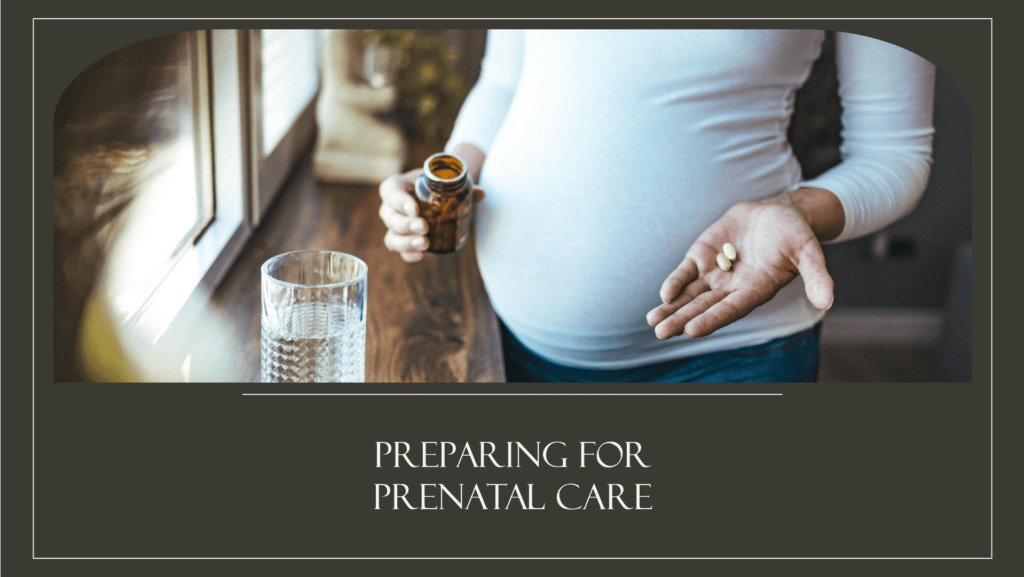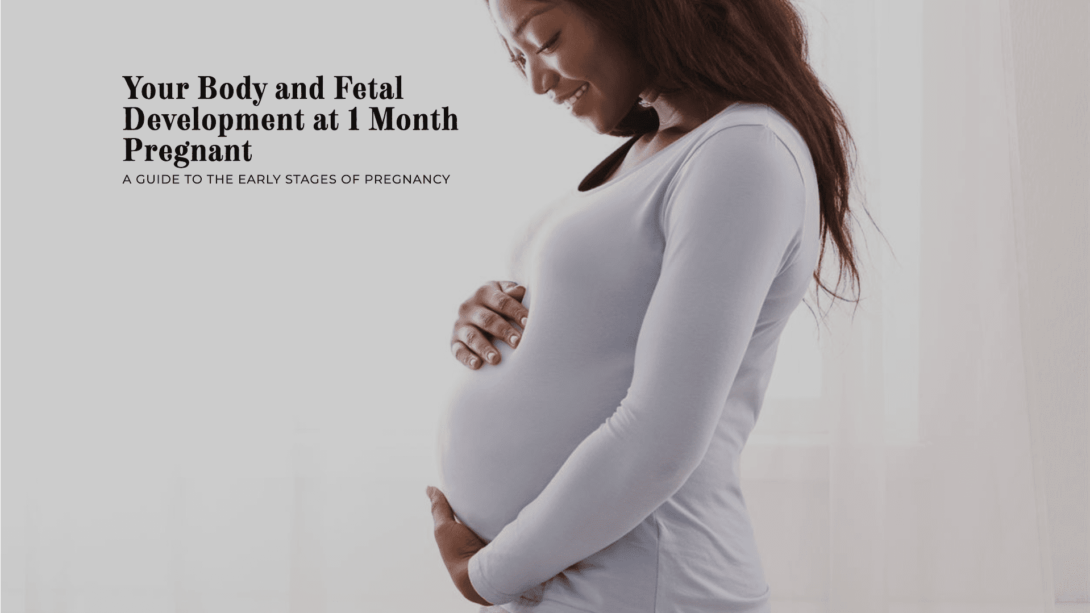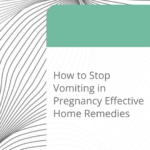Congratulations! You’ve embarked on a beautiful journey of motherhood, and you’re now one month pregnant. This remarkable phase comes with a whirlwind of emotions, physical changes, and the promise of new life growing inside you. To help you navigate through this incredible time, we’ve put together a comprehensive guide that covers everything you need to know about being one month pregnant.
Understanding 1 Month Pregnant
At one month pregnant, you may not yet be showing, but there are already significant changes happening within your body. The first month marks the early stages of pregnancy when the fertilized egg implants itself into the uterine lining, and the miraculous process of fetal development begins.
Symptoms at 1 Month Pregnant
During this time, you might experience various symptoms due to the surge of hormones and the body adjusting to its new state. Some common symptoms include:

1. Nausea and Morning Sickness:
While the term “morning sickness” is common, it can actually occur at any time of the day. You might feel queasy or vomit, but don’t worry; this is a sign that your pregnancy hormones are at work.
2. Fatigue and Mood Swings:
Feeling unusually tired and experiencing mood swings is a typical symptom at this stage. Your body is undergoing significant changes, and it’s natural to feel emotional during this time.
3. Breast Tenderness and Changes:
Your breasts might feel sore or swollen, and the nipples could become more sensitive. These changes are due to hormonal fluctuations preparing your body for breastfeeding.
4. Increased Urination Frequency:
You might find yourself running to the restroom more often than usual. This is a result of hormonal changes and increased blood flow to your pelvic area.
5. Food Cravings and Aversions:
Some expectant mothers crave specific foods, while others may have strong aversions to certain smells or tastes. These cravings and aversions are attributed to hormonal influences.
Changes in Your Body at 1 Month Pregnant
As your body undergoes various transformations, you might notice some visible and internal changes:
1. Hormonal Changes and Their Effects:
Hormones, such as human chorionic gonadotropin (hCG) and progesterone, play a crucial role in supporting the pregnancy and maintaining the uterine lining.
2. Uterus Expansion and Ligament Stretching:
Your uterus starts to expand to accommodate the growing embryo, which might cause mild cramping and stretching sensations.
3. Weight Gain and Bloating:
Some women experience bloating and a slight increase in weight due to water retention and hormonal changes.
4. Emotional and Psychological Changes:
Pregnancy hormones can impact your emotions, making you feel more emotional or even overwhelmed at times. Don’t hesitate to seek emotional support from your partner, family, or friends.
Fetal Development at 1 Month Pregnant
While your baby may be tiny, it’s growing rapidly during this crucial period of development:
1. Conception and Implantation:
At the beginning of the month, conception occurs when a sperm fertilizes the egg. The fertilized egg then travels down the fallopian tube and implants itself into the uterus.
2. Formation of the Embryonic Disk:
The fertilized egg rapidly divides into a cluster of cells known as the embryonic disk. This disk will eventually develop into all the essential parts of your baby’s body.
3. Early Development of Vital Organs:
During this month, your baby’s heart, brain, and spinal cord begin to form. These vital organs are the building blocks of your baby’s overall development.
4. Placenta Formation and Its Role:
The placenta, a lifeline between you and your baby, starts to develop. It provides essential nutrients and oxygen to support your baby’s growth and removes waste products.
Early Pregnancy Symptoms (at 4 Weeks)
Around the fourth week, you might want to confirm your pregnancy through a home pregnancy test or a visit to your healthcare provider. Additionally, you can track the hCG hormone levels in your blood to get a more precise estimate of your pregnancy’s progression.
What Does My Baby Look Like?

At one month pregnant, your baby is still tiny, measuring about the size of a poppy seed. Visualization through ultrasound might not be very clear, but rest assured, your baby’s development is well underway.
Health and Lifestyle Checklist at 1 Month Pregnant
As you embrace this transformative period, here’s a checklist to help you prioritize your health and well-being:
1. Prenatal Vitamins and Supplements:
Begin taking prenatal vitamins containing folic acid to support your baby’s neural tube development.
2. Healthy Diet and Nutrition Tips:
Focus on a balanced diet rich in fruits, vegetables, lean proteins, and whole grains to provide essential nutrients to your growing baby.
3. Avoiding Harmful Substances:
Say no to smoking, alcohol, and illicit drugs, as they can harm your baby’s development.
4. Exercise and Physical Activity Considerations:
Consult your healthcare provider about safe exercises and physical activities suitable for pregnancy.
Emotional Well-being during Early Pregnancy
The emotional aspect of pregnancy is equally important as the physical one:
1. Coping with Pregnancy Anxiety:
It’s natural to feel anxious during pregnancy. Engage in relaxation techniques, meditation, or prenatal yoga to ease your mind.
2. Support System and Communication with Partners:
Share your feelings and excitement with your partner. A strong support system can make the journey smoother.
3. Managing Stress and Emotional Fluctuations:
Practice stress-reducing activities and communicate your concerns with your healthcare provider.
Preparing for Prenatal Care

Start planning for your prenatal care:
1. Choosing a Healthcare Provider:
Select a qualified obstetrician or midwife to monitor your pregnancy and guide you throughout this beautiful journey.
2. Scheduling Prenatal Appointments:
Regular prenatal check-ups are essential for monitoring your baby’s growth and ensuring your health.
3. Discussing Family Medical History:
Share your family’s medical history with your healthcare provider to assess any potential genetic risks.
Conclusion
As you embrace the first month of your pregnancy, remember that this is just the beginning of an incredible journey. Stay informed, take care of your body and mind, and cherish every moment of this miraculous experience. Seek support from your loved ones and healthcare provider whenever needed, and remember, you’re nurturing the gift of life within you. Congratulations again, and happy parenting!
WHAT ARE THE COMMON SYMPTOMS I CAN EXPECT AT 1 MONTH PREGNANT?
At one month pregnant, common symptoms include nausea, fatigue, breast tenderness, increased urination frequency, and food cravings.
Can I undergo an ultrasound to see my baby at this early stage?
While it might be too early to see your baby through ultrasound, your doctor can track the embryo’s development and confirm the pregnancy.
Is it normal to experience mood swings during the first month of pregnancy?
Yes, mood swings are common due to hormonal fluctuations. Embrace emotional changes and seek support from your partner and loved ones.
Are there any specific foods or habits I should avoid during this stage?
Yes, avoid smoking, alcohol, and illicit drugs. Focus on a healthy diet with essential nutrients to support your baby’s growth.
When should I schedule my first prenatal appointment?
It’s best to schedule your first prenatal appointment as soon as you find out you’re pregnant. Early prenatal care is crucial for a healthy pregnancy.
Share this post: on Twitter on Facebook on Google+


